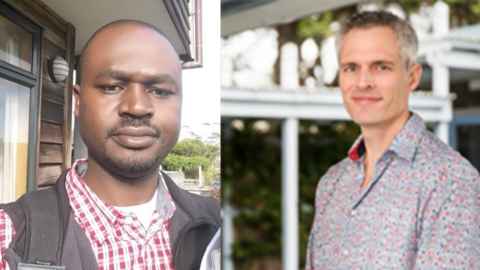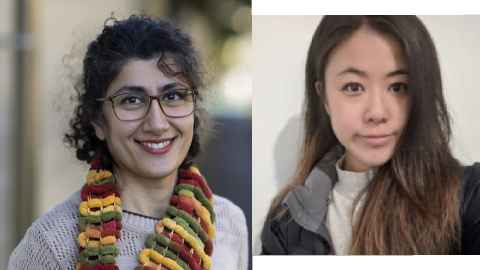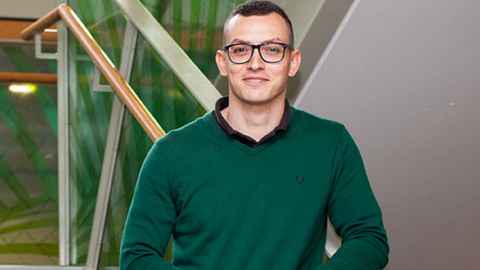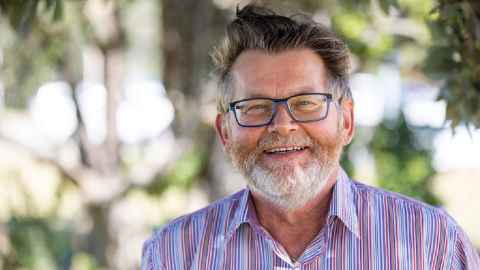COMPASS seminars 2022
Seminars running online and in person.
We are running seminars when we can, from the start of the second half of Semester One:
- Tuesdays, 12 - 1pm
- Level 6, Room 622, Owen G Glenn Building (our office space)
- Click here to join us via Zoom
A Safe Start for Asylum Seekers and a Fair Future for Convention Refugees: Responding to New Zealand’s differential and discriminatory settlement policies

Bernard Sama & Professor Jay Marlowe
Tuesday 20 September 2022
Aotearoa New Zealand provides differential settlement support to refugees and asylum seekers, primarily determined by how they receive protection status. Representing a collaboration between the Asylum Seeker Support Trust and the Centre for Asia Pacific Refugee Studies, we present a report recently launched at Parliament that articulates these differences, drawing on document analysis related to settlement policies, qualitative interviews with asylum seekers and convention refugees, and quantitative insights from the Integrated Data Infrastructure.
Within this report, we start from the premise that fairness requires providing equal access to support – regardless of how a refugee comes to Aotearoa New Zealand – and ensuring asylum seekers are supported appropriately during the refugee status determination process. In this presentation, we provide seven key recommendations that would help ensure a safe start for asylum seekers and fair future for all refugees in Aotearoa New Zealand.
Bernard Sama came to New Zealand more than ten years ago from the Southern Cameroons, seeking protection as a refugee, was formally recognised as a refugee, and is now a New Zealand citizen. He chairs the Asylum Seekers Support Trust and is a cultural advisory member for Refugees as Survivors New Zealand. He is close to completing his PhD at the University of Auckland, supervised by Professor Jay Marlowe and Dr Anna Hood. His thesis explores how the therapeutic jurisprudence perspective could inform and improve New Zealand’s refugee and protection status determination procedure.
Jay Marlowe is Professor of Social Work and co-director of the Centre for Asia Pacific Refugee Studies at the University of Auckland. In 2019 he became a Rutherford Discovery Fellow to pursue a 5-year research programme related to refugee settlement trajectories. As a social worker and former visiting fellow with the Refugee Studies Centre at Oxford University, he has worked with refugee communities as a practitioner and researcher, publishing more than 80 peer-reviewed papers.
Refugees' Resettlement Trajectories in New Zealand

Dr Arezoo Malihi & Annie Chang
Tuesday 9 August 2022
An unprecedented number of people are being displaced every year in the wake of wars, conflicts, and human rights violations. This was projected at 89.3 million people by the end of 2021, before the Ukraine conflict.
As a refugee resettlement country, New Zealand plays a critical role to this global crisis. It has recently doubled its annual resettlement commitment, providing refugees an opportunity to pursue their hopes and dreams in relative safety and security.
Despite this commitment, knowledge concerning integration outcomes and what constitutes positive resettlement is limited. In this study, we identified refugee subgroups (quota, convention, asylum, family reunification) via connecting to immigration databases, to understand differences in service provision to different groups of refugees resettled in New Zealand.
We used Statistics New Zealand’s Integrated Data Infrastructure (IDI) to form a cohort of all working age adult refugees who arrived in New Zealand between 1997 and 2020, to look at their access to housing, education, mental health specialist services, and mobility, alongside their income and employment trajectories over time. We compared income data between immigrant groups and a representative sample of those born in New Zealand.
Dr Arezoo Zarintaj Malihi is a Research Fellow at the Centre for Asia Pacific Studies. She is an interdisciplinary researcher with 3 years of post-PhD experience. She completed her PhD in Population Health on “the safety of long-term Vitamin D supplementation”, working on the ViDA study, a 5-year clinical trial, under the supervision of Prof Robert Scragg.
Trained in nutrition and epidemiology, Arezoo also worked for 3 years as a clinical nutritionist in Iran. Later, she did a master’s in the field of nutritional science, in Malaysia. Since completing her PhD, Arezoo has worked on observational studies in Health and the Social Sciences, including the Childhood Obesity Study, the Family Violence study, a study on resettled refugees’ practices on social media, and most recently, Refugees’ Resettlement Trajectories in New Zealand. In November 2021, Arezoo received an Auckland Medical Research Foundation Fellowship to study the access to mental health services, conditions, and wellbeing of different subgroups of resettled refugees, and compare them to immigrants within the IDI.
Annie Chiang is currently a PhD candidate with the Section of Epidemiology and Biostatistics in the School of Population Health. Her doctoral research looks at ‘missing data’ in New Zealand’s routinely collected datasets, using a mixed-methods approach.
Annie started working with the IDI in 2018, as part of her masters research on suicide risk. Since then, she has been involved in a range of projects in the IDI with topics such as mapping hearing health, gender bias in ethnic communities, refugee settlement, mental health and policing, and the 2018 Indices of Multiple Deprivation.
Framing Ecological Science for Impact in Media Communication

Dr Komathi Kolandai
Tuesday 26 July 2022
The knowledge scientists hold about the natural environment is critical for conservation. Scientists are known for their objectivity and commitment to facts and accuracy. Journalists and the public regard them as highly credible information sources. In this seminar, I share knowledge about “framing” from the communication, behavioural and social psychology literature, focusing on how scientists’ use of different frames (either strategically or intuitively) elicits different responses. Scientists may communicate environmental facts as is, but if they aim to trigger conservation impact (policy, process, or behavioural changes), how they frame their media messages matters.
By considering research-informed strategic framing, scientists could intentionally convey messages in specific ways to influence reception. Strategic framing in ecological science is not akin to “spinning” or propaganda; rather, it is a process of deciding how scientific facts are conveyed or which evidence is more beneficially impactful. Changes to environmental attitudes and behaviour are more important now than ever before. The Homo sapiens species has managed to disrupt every single part of the natural world through overproduction, overconsumption, industrialisation, and non-simplistic living.
Relying on green technology alone is insufficient. Environmental solutions need to include the cessation of destructive human activities in addition to restorative and conservation efforts – all of which require public support. What the public thinks can pressure policymakers and industry to act, and what the public thinks depends on how ecological science is communicated to them.
Dr Komathi Kolandai (Komie) is a Research Fellow at COMPASS Research Centre and the Public Policy Institute. She is an interdisciplinary researcher with over 12 years of post-PhD experience. Her PhD specialisation in environmental media communication included environmental journalism training and education, media environmental social responsibility, and environmental message framing. Between 2018 and 2020, with a post-doctoral fellowship from the George Mason Centre for the Natural Environment, she undertook a transdisciplinary research project on marine conservation communication, which explored the significance of message framing strategies, communication format and channel, and journalist-scientist relationships. She also conducted a media content analysis on marine risk and uncertainty and provided recommendations for effective marine science framing for a Sustainable Seas Project.
Komie’s current research includes COVID-19-related environmental perceptions and attitudes and a collaborative research project with the Queensland University of Technology and Victoria University of Wellington on media coverage and framing of the underlying environmental causes of the COVID-19 pandemic.
Komie has a long-standing commitment to conservation and substantial paid and voluntary work experiences in the environmental and sustainability fields. Prior to academic roles, she was the coordinator of an award-winning World Wide Fund for Nature ecological education project in Malaysia. She was also involved in multiple environmental and social advocacy campaigns, international lobbying, and policy advocacy work with the Pesticide Action Network.
Estimating Intergenerational Mobility in New Zealand using Longitudinal Census Data

Leon Iusitini
Tuesday 19 July 2022
The transmission of economic advantage and disadvantage within families is a topic of considerable interest to policymakers and the general public, yet there has been little research directed to understanding the extent to which income persists across generations in New Zealand or the mechanisms by which this occurs. The aim of this study is to estimate the degree of intergenerational income persistence between parents and their offspring in New Zealand and to explore some of the underlying drivers of such persistence.
The study uses data from the New Zealand Longitudinal Census, a dataset that links census microdata at the individual level over a 32-year timespan and in which offspring can be matched to their parents. The analysis estimates the intergenerational elasticity of individual total income among father-son and mother-daughter pairs, where sons are born between 1967 and 1979, daughters born between 1967 and 1974, and a proxy for the lifetime average income of parents and offspring is constructed, taking into account well known sources of measurement error including attenuation and lifecycle biases.
The results find that, by international comparison, income persistence in New Zealand from fathers to sons is comparatively low (mobility is high) and sons’ educational attainment and occupation play important mediating roles. In contrast, persistence from mothers to daughters is comparatively high (mobility is low) and daughters’ educational attainment and occupation play a much smaller role in generating this persistence than sons’.
Leon Iusitini is a Senior Research Fellow at the New Zealand Work Research Institute at Auckland University of Technology (AUT). He recently completed his PhD on intergenerational income mobility in New Zealand and previously spent 15 years as a researcher on the longitudinal Pacific Islands Families Study at AUT (with which he remains an affiliate researcher). Leon has wide-ranging research interests spanning social mobility, political participation, and Pacific health and well-being.
Left Behind: The impact of transience on children who don’t shift

Gavin Brown
Tuesday 14 June 2022
Many NZ children experience a great deal of transience during their schooling years with notable negative effects psychologically and socially. Less is known about how transience in the environment affects children who themselves are not transient from their school. The Kiwi Can project is a values and life skills-based programme delivered in primary/ intermediate schools in low socioeconomic communities aimed at helping children develop positive relationships.
A large-scale repeated measures survey (n1 = 1,740; n2 = 1,520; matched n = 1,219) was administered in Kiwi Can (k = 15) and control (k = 9) schools to track children’s perceptions of classroom climate and positive social development. Kiwi Can schools were separated into 2 groups (new = 7 schools with less than 2 years in the programme; experienced = 8 schools with more than 2 years). Degree of transience (grand M = 25%, SD = 13%) was derived from the percentage of participants who did not complete both surveys, relative to the roll of students.
Attitudes were measured with previously published inventories, resulting in 7 factors for positive youth development and 4 factors for classroom climate, all with good fit as determined in confirmatory factor analysis. Repeated measures analysis of variance evaluated 2 transience conditions and 2 Kiwi Can experience conditions (all control schools had low transience). All scales had lower scores at Time 2, with considerably larger reductions in high transience schools that were new to Kiwi Can (especially for Connection to School and Positive Behaviour & Supportiveness in Classrooms).
Study demonstrates that experience with Kiwi Can mitigates negative effects of high levels of transience. More importantly, high levels of transience have notable negative effects on children’s subjective well-being. Being left behind is not easy.
This work was done by Dr Rachel Williams, under the supervision of Dr Pat Bullen and Gavin.
Professor Gavin Brown is the Director of the Quantitative Data Analysis and Research unit in the Faculty of Education and Social Work here at the University. He is a psychometrician and cross-cultural psychologist focused on assessment. Gavin is a Fellow of the Association for Psychological Science, an Associate Professor with the Department of Applied Educational Sciences at Umeå Universitet, Sweden, an Honorary Professor with the Department of Curriculum and Institution at the Education University of Hong Kong, and the Chief Section Editor for Assessment, Testing, and Applied Measurement in the Frontiers in Education journal.
Whakapapakāinga: Low Carbon and High Cultural Connectedness Futures for Community Crossgenerational Benefit

Stephen McTaggart & Lucy Matehaere
Tuesday 24 May 2022
‘Project Kāinga’ is a five-year research programme working with 7 rural marae communities to help them respond to the challenges of climate change. These kāinga (communities) want to build resilience to climate change impacts that they are already experiencing, such as flooding, droughts, changing waterway biodiversity and quality, and sea level rise. In addition to exploring innovative new activities on their lands, households and marae can prepare for changing climate futures and help reduce greenhouse gas emissions at these scales.
Our team is helping kāinga develop tikanga-based, economically affordable and community-relevant responses to climate change, which may also help tackle other related ‘big issues’ like food sovereignty, water quality, energy affordability, and poverty. Ultimately, we hope to build a mix of innovations and leadership responses that restore oranga, or good health, to lands, water and our people. This presentation gives insights into Stephen’s and Lucy’s mahi within the project. Project Kāinga follows the kaupapa Māori research model.
Stephen McTaggart holds an Honorary Academic position at the University of Auckland and is director of McTaggart Research Aotearoa. He has a PhD in Sociology from the University of Auckland. His main interests are in Māori and Pasifika community wellbeing, heterogeneity within the Aotearoa New Zealand voluntary organisational workforce sector, and survey research. Most recently, his mahi has focused on the structures and importance of connectedness between Rangatahi (youth) and their Tūrangawaewae (ancestral marae) in Aotearoa; kāinga experiences of and responses to climate change, and development and building of robust internal/external evaluation models for Community Emergency housing organisations.
Lucy Matehaere (Ngāti Raukawa) is finishing her BSc part time at the University of Auckland. She is a Research Assistant on Project Kāinga, working to investigate Iwi/Hapū Environmental Management Plans and their kōrero (discussions) on Climate Change. She is also a full-time athlete, training with the NZ High Performance squad for sprint kayaking, and coaching at her local club.
Ten Years of the Integrated Data Infrastructure (IDI): What have we learned & what are unresolved issues?

Barry Milne
Tuesday 3 May 2022
In 2011, Statistics New Zealand established the Integrated Data Infrastructure (IDI), a collection of de-identified whole population administrative data sets, linked at the individual level, and made available for ‘public good’ research. While initially a tool mainly used by government researchers, and with a heavy early focus on ‘social investment’, the IDI is now used by academic and non-government, as well as government researchers, and >100 papers and reports covering a wide range of research areas are being generated annually.
In this seminar I will describe the IDI and how it has been and can be used. I will also highlight some unresolved issues, including the need to monitor social licence, the lack of robust ethical governance, and the recognition of Māori data sovereignty.
Barry Milne is Director of COMPASS Research Centre. He has a Masters degree in psychology from the University of Otago and a PhD in Psychiatric Epidemiology from Kings College London. His main interests are in lifecourse research, survey research, and the use of administrative data to answer policy and research questions.